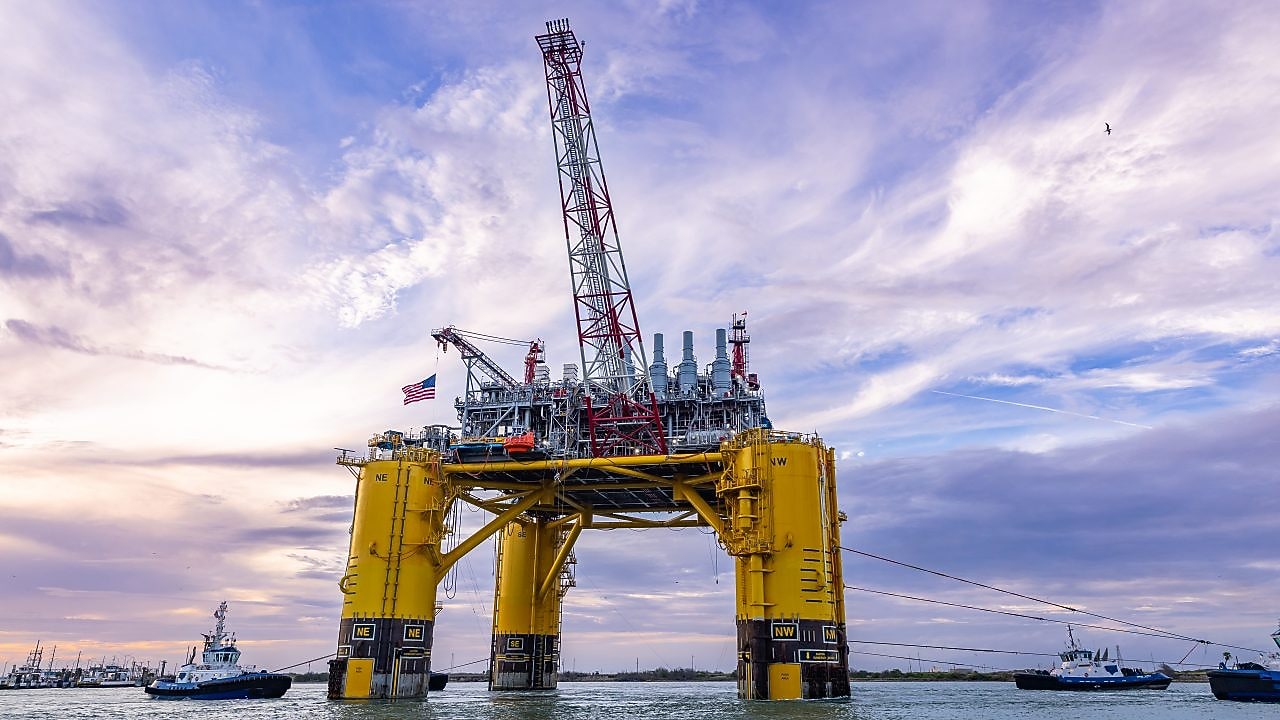Our work with industry associations
Industry associations play an important role in developing and implementing industry standards and best practices in areas such as health, safety, security and the protection of the environment. They also provide a valuable platform for industry-wide engagements with governments, regulators and communities on issues including climate change, trade, transport and tax.

Climate and Energy Transition Lobbying Report 2024
This report provides an update on our direct and indirect climate and energy transition lobbying in 2024. It is the seventh year that we have reported on our industry associations and provided updates about our advocacy related to climate and the energy transition.
Our principles for participation in industry associations
Our approach
Governance
We have an internal management framework for industry associations. This builds on the foundations of the Shell Performance Framework, which is the overarching framework adopted by Shell to deliver on its strategy and business objectives. Our management framework for industry associations also builds on Shell’s General Business Principles, Code of Conduct and Ethics and Compliance Manual.1
Climate and energy transition policy and advocacy alignment
- Within the industry associations we are a member of, we are committed to advocating policies that we believe are in line with the goals of the Paris Agreement and the world achieving net-zero emissions by 2050.
- We publish our climate and energy transition public policy positions on www.shell.com/advocacy. They serve as a global framework for our advocacy on climate and energy transition topics. Shell relationship managers for industry associations are provided with guidance about advocating in line with these positions. We have processes in place to guide staff if we identify misalignment with an industry association.
- Every two years, we publish a review of the policy and advocacy positions of selected industry associations, which includes the methodology for selecting and assessing the associations. Where we identify misalignment with any of our assessment criteria, we set out how we plan to address this and provide an update the following year. Important decisions relating to the review are taken by the senior executive with oversight of Shell’s public policy and advocacy priorities and positions. Where necessary, issues can be escalated in accordance with our usual escalation protocol. This is part of our annual assurance process.
- Where we identify misalignment with any of our assessment criteria, Shell takes one or more of the following steps depending on our assessment of the importance of the topic, the extent of the misalignment and the broader value of our membership:
- continue to be transparent about our own policy and advocacy positions, and the differences with our selected industry associations, by publishing this information on our website;
- remain in the association and engage with it in areas where we have different views;
- pursue our advocacy independently or through other associations or coalitions; and/or
- reassess our membership, including weighing up the broader business value of remaining in the association and the likelihood of the association changing its position(s), against ending activities such as board and committee participation or ending overall membership.
Working with industry associations
Climate and energy transition policy and advocacy
We believe that any industry association we are a member of, that is involved in climate and energy transition policy and advocacy, should lobby in line with the goals of the Paris Agreement and the world achieving net-zero emissions by 2050.
Transparency
We believe that the industry associations we are a member of should publish the following information on their website:
- an overview of the association’s governance and decision-making related to policy and advocacy;
- a list of member companies, including members of their governing body or bodies; and
- the association’s main public policy positions, consultation submissions and other evidence of advocacy positions (if appropriate).
We encourage industry associations to be transparent about their fee structures for membership.
Industry associations and similar organisations we are a member of
The list below shows the general and multi-sector business associations, sector-specific industry associations and issue-specific organisations that we are a corporate member of, and where we paid a membership fee or dues of $50,000 or above in 2023.
See below for the methodology used to compile the list.
List of industry associations and similar organisations we are member of
List of industry associations and similar organisations we are member of
| Organisation name | |
|---|---|
| Advanced Biofuels Association (ABFA) | Hydrogen Council |
| Alliance To End Plastic Waste (AEPW) | Hydrogen Fuel Cell Partnership (H2FCP) |
| American Chemistry Council (ACC) | Independent Project Analysis (IPA) |
| American Clean Power Association (ACP) | International Association of Drilling Contractors (IADC) |
| American Cleaning Institute (ACI) | International Association of Oil & Gas Producers (IOGP) |
| American Petroleum Institute (API) | International Swaps and Derivatives Association, Inc. (ISDA) |
| Association of National Advertisers (ANA) | International Tax and Investment Center (ITIC) |
| Assorisorse (Risorse Naturali ed Energie sostenibili) | International Transport Forum (ITF) - Corporate Partnership Board |
| Australian Energy Council (AEC) | Ipieca |
| Australian Energy Producers (AEP) | Isopa |
| Australian Institute of Petroleum (AIP)¹ | Liquid Energy Pipeline Association (LEPA) |
| Australian Resources and Energy Employer Association (AREEA) | Long Duration Energy Storage (LDES) Council |
| Automotive Maintenance and Repair Association (AMRA) | Louisiana Chemical Association (LCA) |
| BDEW (Bundesverband der Energie- und Wasserwirtschaft e.V.) | Louisiana Energy Users Group (LEUG) |
| Biogas Danmark | Louisiana Mid-Continent Oil & Gas Association (LMOGA) |
| Bluewater Association for Safety, Environment, and Sustainability (BASES) | Materials Technology Institute (MTI) |
| Brazilian Petroleum, Gas and Biofuels Institute (IBP)/Associação Brasileira de Empresas de Exploração e Produção de Petróleo e Gás (ABEP)² | NACS (Advancing Convenience & Fuel Retailing) |
| Business Council of Australia (BCA) | National Association of Manufacturers (NAM) |
| Business Council of Canada (BCC) | National Ocean Industries Association (NOIA) |
| California Hydrogen Coalition (CHC) | Natural Gas Supply Association (NGSA) |
| California Manufacturers & Technology Association (CMTA) | Nederland Waterstofland |
| Cámara Argentina de la Energía (CADE) | Nederlandse Vereniging Duurzame Energie (NVDE) |
| Canadian Association of Petroleum Producers (CAPP) | NedZero |
| Canadian Fuels Association (CFA) | Net Zero Technology Centre |
| Center for Innovative Policy (CIP) | New Energy Coalition (NEC) |
| Center for Liquefied Natural Gas (CLNG) | NLHydrogen |
| Chemistry Industry Association of Canada (CIAC) | Northeast Capital Industrial Association (NCIA) |
| Clean Energy Buyers Association (CEBA) | Offshore Energies UK (OEUK) |
| CO2CRC | Offshore Norge |
| Confederation of British Industry (CBI) | Offshore Operators Committee (OOC) |
| Confederation of Netherlands Industry and Employers (VNO-NCW) | Oil and Gas Climate Initiative (OGCI) |
| Consortium of Automotive Industry and Technology (CAIT) | Oil Producers Trade Section (OPTS) |
| Consumer Energy Alliance (CEA) | ONE-ISAC (Oil and Natural Energy Information Sharing and Analysis Center) |
| Danish Industry (DI) | Plastics Europe |
| Deltalinqs | Ras Laffan Environmental Society (LES) |
| Dutch Fund and Asset Management Association (DUFAS) | Renewable Energy Wildlife Institute (REWI) |
| Electric Power Research Institute (EPRI) | Republican Governors Public Policy Committee (RGPPC) |
| Electric Power Supply Association (EPSA) | Retail Energy Advancement League (REAL) |
| en2x (Wirtschaftsverband Fuels und Energie e.V.) | Royal Association of the Dutch Chemical Industry (VNCI) |
| EnerGeo Alliance | Singapore Chemical Industry Council (SCIC) |
| ENERGIA | Solar Energy Industries Association (SEIA) |
| Energy Futures Lab (EFL) | SolarPower Europe |
| Energy Institute (EI) | Styrene Information & Research Center (SIRC) |
| Energy UK | Texas Civil Justice League (TCJL) |
| Eurobitume (European Bitumen Association) | Texas Competitive Power Advocates (TCPA) |
| Eurogas | Texas Oil & Gas Association (TXOGA) |
| European Chemical Industry Council (Cefic) | The Abdullah Bin Hamad Al-Attiyah International Foundation for Energy and Sustainable Development (Al-Attiyah Foundation) |
| European Fuel Manufacturers Association (EFMA), includes FuelsEurope and Concawe | The Conference Board Inc. |
| European Round Table for Industry (ERT) | The National Lubricant Container Recycling Coalition (NLCRC) |
| Extractive Industries Transparency Initiative (EITI) | The Open Group |
| French Association of Large Companies (AFEP) | The Sulphur Institute (TSI) |
| Fuels Industry Association of South Africa | The Welding Institute (TWI) |
| Fuels Industry UK | U.S. Chamber of Commerce (USCC) |
| Geothermie Nederland | UFIP Énergies et Mobilités |
| Global CCS Institute (GCCSI) | UK Chamber of Shipping |
| Global Maritime Forum | UNITI Bundesverband EnergieMittelstand e.V. |
| Global Road Safety Partnership (GRSP) | VEMW (Vereniging voor Energie, Milieu en Water) |
| Global Wind Energy Council (GWEC) | Verband der Chemischen Industrie e.V. (VCI) |
| Greater Houston Partnership | Vereniging Energie voor Mobiliteit en Industrie (VEMOBIN) |
| Grow Louisiana Coalition | Western States Petroleum Association (WSPA) |
| Gulf of America Alliance | WindEurope |
| H2Accelerate | World Business Council for Sustainable Development (WBCSD) |
| Health and Environmental Sciences Institute (HESI) | World Economic Forum (WEF) |
| Houston CCS Alliance | ZVEI (Verband der Elektro- und Digitalindustrie e.V.) |
1 We are an associate member of AIP to access the services provided by AIP's subsidiary, the Australian Marine Oil Spill Centre (AMOSC). Membership of AMOSC includes associate membership of AIP; we do not participate in AIP’s activities.
2 We pay a membership fee to ABEP, which is an association that participates in IBP and pays its own membership fee to IBP.
Note: The organisations listed below are included in our Climate and Energy Transition Lobbying Report 2024, but are not included in the list above. They are not in scope of the list since the 2023 membership fee payment was under $50,000.
| Organisation name |
|---|
| Australian Industry Greenhouse Network (AIGN) |
| Australian Industry Group (Ai Group) |
| BusinessEurope |
| Chamber of Minerals and Energy of Western Australia (CME) |
| China Petroleum and Chemical Industry Federation (CPCIF) |
| European Union Chamber of Commerce in China |
| Hydrogen Europe |
| International Air Transport Association (IATA) |
| International Emissions Trading Association (IETA) |
| International Gas Union (IGU) |
| KAZENERGY Association |
| Malaysian Gas Association (MGA) |
| Nigerian Gas Association (NGA) |
Methodology
Methodology
The companies in which Shell plc directly and indirectly owns investments are separate legal entities. In this list “Shell” is used for convenience where references are made to Shell plc and its subsidiaries in general. In certain cases, more than one Shell entity is a member in an association.
Our internal processes require staff to record memberships of industry associations and similar groups in our Code of Conduct Register. The above list is based on data provided by relationship managers in the register and/or data validated by our Corporate Relations function. Information on membership fee/dues is based on data from invoices and/or records in our internal finance systems. Any payments made in local currencies are converted to US dollars using Shell standard conversion rates that we use for planning purposes.
This list focuses on organisations relating to industry issues. It does not include organisations categorised as professional bodies, think tanks, or consortia focused on regulatory compliance, Joint Industry Projects, research-focused organisations or response groups (including emergency response).
The list is not exhaustive and is subject to change. It will be reviewed against data from our Code of Conduct Register on a regular basis and may be updated as a result.
In some cases, an organisation’s invoice(s) may cover sub-organisations or forums too; in such cases we have only listed the main organisation that provided the invoice. In other cases, an organisation may charge additional obligatory fees, similar to membership fees, that we have taken into account for the list.



